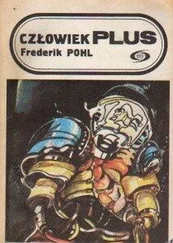He became conscious of someone standing behind him. “Good morning, Father Kayman.”
“Hello, Sulie.” He glanced at her curiously. What was strange about her? There seemed to be golden roots to her dark hair, but that was nothing particularly surprising; even a priest knew that women chose their hair color at will. For that matter, so did some priests.
“How’s it going?” she asked.
“I’d say perfect. Look at them jump! Roger looks as ready as he’ll ever be and, Deo volente , I think we’ll make the launch date.”
“I envy you,” the nurse said, peering past him into the Mars-normal tank. He turned his face to her, startled. There had been more feeling in her voice than a casual remark seemed to justify. “I mean it, Don,” she said. “The reason I got into the space program in the first place was that I wanted to go up myself. Might have made it if—”
She stopped and shrugged. “Well, I’m helping you and Roger, I guess,” she said. “Isn’t that what they used to say women were for? Helpmates. It isn’t a bad thing, anyway, when it’s as important a thing to help as this.”
“You don’t really sound convinced of that,” Kayman offered.
She grinned and then turned back to the tank.
The music had stopped. Kathleen Doughty took the cigarette out of her lips, lit another and said, “Okay, Roger, Alfred. Take ten. You’re doing great.”
Inside the tank Roger allowed himself to sit crosslegged. He looked exactly like the Devil squatting on a hilltop in the classical old Disney tape, Kayman thought. A Night on Bald Mountain?
“What’s the matter, Roger?” Kathleen Doughty called. “You’re surely not tired.”
“Tired of this, anyway,” he groused. “I don’t know why I need all this ballet-dancing. Willy didn’t have it.”
“Willy died,” she snapped.
There was a silence. Roger turned his head toward her, peering through the glass with his great compound eyes. He snarled, “Not because of lack of entrechats.”
“How do you know that? Oh,” she admitted grudgingly, “I suppose you could survive without some of this. But you’re better with it. It’s not just a matter of learning how to get around. The other thing you have to learn to do is avoid destroying your environment. Do you have any idea how strong you are now?”
Inside the tank Roger hesitated, then shook his head. “I don’t feel strong, particularly,” his flat voice said.
“You can punch through a wall, Roger. Ask Alfred. What do you run the metric mile in, Alfred?”
The ex-paraplegic folded his hands over his fat belly and grinned. He was fifty-eight years old and had not been much of an athlete even before the myasthenia gravis destroyed his natural limbs. “A minute forty-seven,” he said with pride.
“I expect you to do better than that, Roger,” called Kathleen. “So you have to learn how to control it.”
Roger made a noise that wasn’t quite a word, then stood up. “Balance the locks,” he said. “I’m coming out.”
The technician touched a switch and the great pumps began to let air into the exit chamber with a sound like ripping linoleum. “Oh,” moaned Sulie Carpenter, next to Don Kayman, “I don’t have my contacts in!” And she fled before Roger could come into the room.
Kayman stared after her. One puzzle was solved: he knew what had looked strange about her. But why would Sulie wear contacts that changed her brown eyes to green?
He shrugged and gave up.
We knew the answer. We had gone to a lot of trouble to find Sulie Carpenter. The critical factors made a long list, and the least important of the items on that list were the color of hair and the color of eyes, since either could be so easily changed.
As the deadline approached, Roger’s position began to change. For two weeks he had been meat on a butcher’s block, slashed and rolled and chopped with no personal participation and no control over what happened to him. Then he had been a student, following the orders of his teachers, learning the control of his senses and the use of his limbs. It was a transition from laboratory preparation to demigod, and he was more than halfway there.
He felt it happening. For days now he had been questioning everything he was told to do and sometimes refusing. Kathleen Doughty was no longer his boss, capable of ordering him to do a hundred chinups and an hour of pirouettes. She was his employee, retained by him to help in what he wanted to do. Brad, who had become far less offhandedly humorous and far more intense, was now asking Roger for favors: “Try these color discrimination tests for me, will you? It’ll look good on my paper about you.” Often Roger humored them, but sometimes not.
The one he humored most frequently and surely was Sulie Carpenter, because she was always there and always cared about him. He had almost forgotten how much she looked like Dorrie. He only was aware that she looked very good.
She met his moods. If he was edgy she was quietly cheerful. If he wanted to talk, she talked. They played board games sometimes; she was a highly competitive Scrabble player. Once, late at night, when Roger was experimenting with the length of wakefulness he could handle, she brought in a guitar and they sang, her pleasant, unobtrusive contralto ornamenting his flat and almost toneless whisper. Her face changed while he looked at it, but he had learned to handle that. The interpretation circuits in his sensorium reflected his feelings when he let them, and there were times when Sulie Carpenter looked more like Dorrie than Dorrie did herself.
After he had finished his day’s run in the Mars-normal tank, Sulie raced him back to his room, laughing girl against thudding monster down the wide lab corridors; he won easily, of course. They chatted for a while and then he sent her away.
Nine days to liftoff.
It was less than that, really. He would be flown to Merritt Island three days before the launch, and his last day in Tonka would be devoted to fitting the backpack computer and retuning some of his sensorium for the special Martian conditions. So he had six — no, five — days.
And he had not seen Dorrie for weeks.
He looked at himself in the mirror he had demanded they install: insect eyes, bat wings, dully gleaming flesh. He amused himself by letting his visual interpretations flow, from bat to giant fly to demon… to himself, as he remembered himself, pleasant-faced and youthful.
If only Dorrie had a computer to mediate her sight! If only she could see him as he had been! He swore he would not call her; he could not force her to look at the comic-strip contraption that was her husband.
Having sworn, he picked up the phone and dialed her number.
It was an impulse that could not be denied. He waited. His accordion-pleated time sense prolonged the interval, so that it was an eternity before the raster blaze from the screen and the buzz from the speaker sounded the first ring.
Then time betrayed him again. It seemed forever until the second ring. Then it came, and lasted an eternity, and was over.
She did not answer.
Roger, who was the sort of person who counted things, knew that most persons did not respond until the third ring. Dorrie, however, was always eager to know who the phone was bringing into her life. From a sound sleep or out of the bathtub, she seldom let it ring past twice.
At length the third ring came, and still no reply.
Roger began to hurt.
He controlled it as best he could, unwilling to sound the alarms on the telemetry. He could not stop it entirely. She was out, he thought. Her husband had turned into a monster and she was not at home sympathizing or worrying; she was shopping or visiting a friend or seeing a flick.
Or with a man.
Читать дальше












